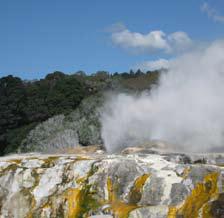
Rotorua still has bargains on offer despite rising prices
Its tourism slogan is ‘New Zealand’s coolest hotspot’ and the Rotorua housing market is showing strong signs that it’s not just the hot pools and geysers that are on the boil.
With 18 lakes, the Redwoods forest and its internationally renowned mountain bike tracks, it’s a region enticing people to abandon the rat-race of the SuperCity and make a move a couple of hours south.
It’s a push the local council is now marketing, focused solely on Aucklanders to choose a lifestyle free from major traffic congestion and high mortgages.
Rotorua Mayor Steve Chadwick says the district is on the rise.
“Our GDP growth has been above the national average for the past year, we’ve got developments happening and business confidence is high,” Chadwick says.
“We know Rotorua is a great place to live and do business and we enjoy a fantastic lifestyle. We’re starting to see people relocating here as a result of all that.
“Kiwis are visiting more often, staying longer and spending more and we’ve just had two record months for visitor nights and visits to attractions and activities. It’s a good time to take the next step and position Rotorua as a great relocation option.”
According to the council’s 2030 vision, tourism is expected to grow to become a $1 billion industry. A multi-million dollar lakefront spa and hotel complex is to be built next year, the Mountain Bike National High Performance Hub was recently launched, and a $20 million shopping complex will be completed in 2018 with Kmart as its major tenant.
Bang for your buck
Rotorua Property Investors’ Association president Debbie Van den Broek believes bargains are still available despite prices having gone and up and yields falling in the last year.
Latest REINZ figures show the median price is $300,000 - a far cry from the asking price half a million plus in Tauranga and Hamilton.
“When you look at the tourism, the opportunities and developments in Rotorua,” Van den Broek says. “I still think it’s seriously underpriced. When you look at the number of visitors per night staying in Rotorua, it’s a much more vibrant town than it was 10 years ago.
“We have this huge tourist boom which tourist sites will have to cope with over the next 10 years. They all have to be accommodated, people have to clean their rooms, feed them. There will be a whole a need for employment in the city.”
She says yields are slightly down compared with last year.
“They’ve probably dropped by at least 2%. Before you were at nine to 10 percent and you could get a decent home. Now you’re probably looking at six, [you’d] struggle to get eight percent now.”
Steve Lovegrove, owner of Professionals McDowall, says the city is now firmly on the radar of investors with capital growth between 25% and 30%.
“For a long time, Rotorua has sat relatively unnoticed,” Lovegrove says. “It’s been seen as the poor cousin to other cities in the Bay of Plenty region and there is currently an awakening if you like; investors from other areas out of Rotorua, are now starting to turn their attention here.
“There’s been a rapid increase over the last 12 months of values in Rotorua. I believe that’s a catch up and there’s still more catch up to go, especially since there is genuinely still more population growth to continue and net migration continues. While the interest rates stay low, it’s just not going to stop.
“If you looked at the Auckland, Tauranga, Hamilton market places and throw Rotorua into the mix, it’s probably now seen as the best bang for your buck.”
While there’s a reasonable quantity of stock available, investors needed to move quick, he says.
Beth Millard, manager of Bayleys Rotorua agrees. “Competition is tougher,” Millard says. “I guess when people who invested in Rotorua in the past have done lots of research, took their time, researched stats, did copious amounts of due diligence and now with the heat in the market currently, they’ve had to transact quick or they simply miss out,” she says.
“Our city is genuinely the last city to get on a hot market but we actually get off quite quickly as well and the reason for that is because previously we have had very little migration.”
The LVR effect
The market has slowed slightly since the new loan-to-value ratio (LVR) rules kicked in but Millard says the lull is only temporary.
“It’s definitely eased the pressure on the investment end of the market. But it hasn’t really changed anything, it’s just opened the door for first home buyers. But if an investor is competing with a first home buyer, even if they come in a bit lower, if they have their ducks all lined up in a row and they can come in hard and come in with cash, more often they will win out,” she says.
“I think it’s a little bump in the road, I think [investors will] come back. I think we will probably have a really strong November, things button off a wee bit in December but I don’t see the market changing anything, I see it as a little speed bump.
Van den Broek believes the new rules help calm the competition. “I think [recently] there was a quiet patch when nothing sold, I think perhaps [that’s the] 40% kicking in. But that’s good, people are making more rational decisions rather than having to buy at all costs.
Rentals in demand
Stock - there barely is any, is the collective cry of property managers with houses rented within hours of being listed.
Donna Russell, co-owner of ReMax Rotorua and Russell Hardie property management, says she believes the demand is unprecedented.
“I have never, ever seen it like this,” Russell says. “Back in the early days you had a 10% vacancy rate, so across the board we would have approximately 40 properties to rent. Now we’re lucky if we have four,” she says.
“What that has done has pushed the rents up because of that shortage. It’s created a very, very competitive environment for tenants and it’s created a very powerful environment for landlords. Landlords are getting to pick and choose.”
Russell says tenants are staying longer, too. “Once upon a time a one-bedroom, would be about $150, $160. My two-bedroom flats that used to go for $180 are now getting $235. My three-bedroom houses a year ago were getting $285 and are now getting $330 and my four-bedroom homes, landlords can just name their price because there aren’t any,” she says.
Richard Evans, co-director of Rotorua Rentals, has been in the industry for 35 years and warns investors not to expect this flush period to last forever.
“It worries me a little bit because when there’s plenty of demand and not much supply some of those high rents may not be sustainable,” Evans says. “That may sound a bit negative but some investors are buying properties and are expecting to get these high rents forever and that might not be the case every time.”
Both say demand is always high in popular suburbs - Lynmore, Springfield, Tihiotonga, Hillcrest and Glenholme with Fordlands, Pohutakawa Drive and Owhata still at the lower end, higher risk and higher turnover areas.
Looking way south
What started as a search for an investment in South Auckland led Michael Williams to buy his first property in Rotorua last September.
The 29-year-old Aucklander purchased a house with two flats for $380,000 with the help of Van den Broek’s IFind Property services.
“I started looking in South Auckland for houses and apartments but body corps and that sort of things just killed me on returns,” Williams says.
“So I started looking further and further out. Hamilton had already started to move and most places were out of my price range. So Rotorua seemed like it was a best place for investing where you could still get capital gains and good returns. It has a stable population, the tourism industry - it was a stable place to invest. I figured it was less risky than other areas.”
With $10,000 in renovations spent the property is now valued at $480,000, a combined rental return of $820 a week or 8.9% yield.
“It’s a fantastic spot, it’s right in the middle of town, in Victoria, which is really popular with renters as it’s walking distance from town. It’s a really pleasant area.”
He has since bought two two-bedroom units in Western Heights for $230,000.
“At the moment they are just cashflow negative. So I need to spend about $40,000 to get them cashflow positive, but after that I”ll continue to save and see how the market goes and look to buy another one.”





 Search
Search
